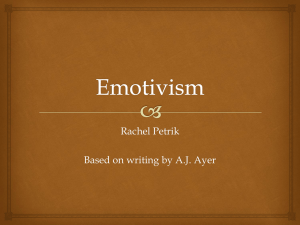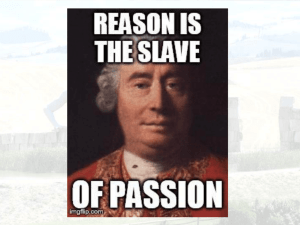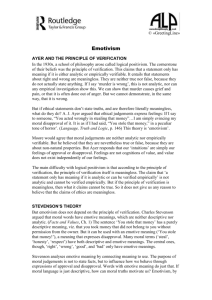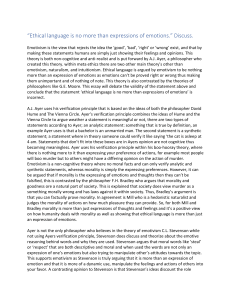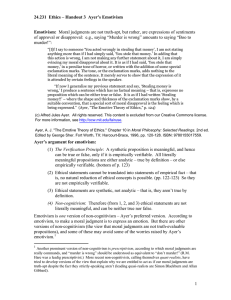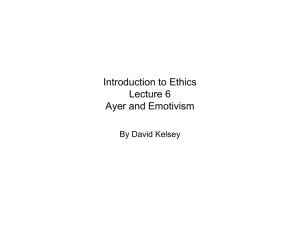ayers emotivism
advertisement
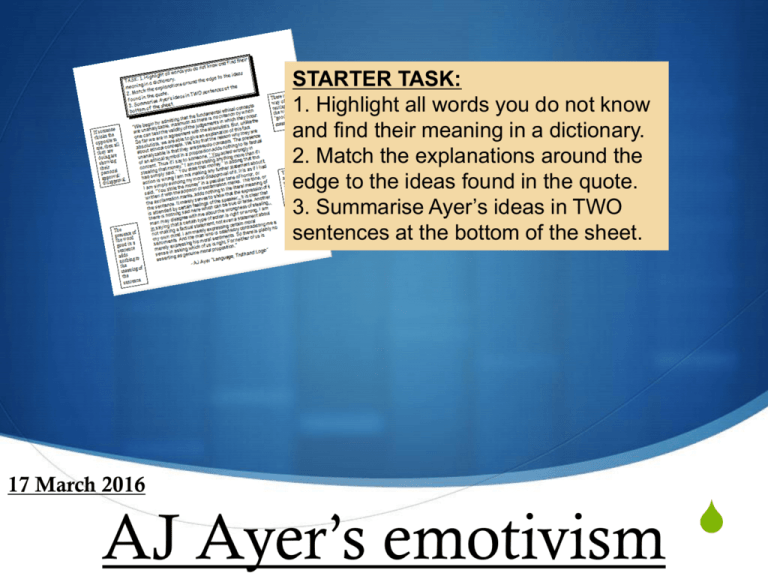
STARTER TASK: 1. Highlight all words you do not know and find their meaning in a dictionary. 2. Match the explanations around the edge to the ideas found in the quote. 3. Summarise Ayer’s ideas in TWO sentences at the bottom of the sheet. 17 March 2016 AJ Ayer’s emotivism S Recap S What is Moral Realism? S What is Moral Anti-Realism? S What did Moore say about Complex and Simple ideas? Intuitionism, the key players … S You must make sure that you are aware of the following: S G. E. Moore and The Open-Question Argument S H. A. Prichard and how he differs from Moore S W. D. Ross and the Prima Facie obligations Evaluation of Intuitionism Points For Points Against S Makes logical sense we do S How can you account for the differences between people’s intuitions of good? Did Hitler make an intuitive mistake? Surely this proves it is subjective. S Is intuition a sixth sense? Verify please! S If there are conflicts there is no way of concluding who is right. S Can someone lack intuition? have examples in the world of people making decisions without using reason, gut feeling. S It presents a simple guideline for how to make moral decisions. S It provides an explanation for incapability to define good. Logical Positivism and the Verification Principle S Interested in science; sceptical of theology and metaphysics. Any truth claim must be tested by sense experience. Therefore, ethical statements NOT genuine truth claims. S The verification principle: a statement is only meaningful if there is a conclusive procedure determining whether it is true or false. S Therefore, ‘God exists’ is a meaningless statement. S Types of meaningful statement: analytic (true by definition) and synthetic (true by evidence) Analytic and Synthetic statements S Analytic statements – the truth of falsity of the statement can be determined simply by understanding the terms that occur in them. Examples of analytic statements are statements of mathematics or logic. E.g. ‘All bachelors are unmarried men.’ ‘All red parrots are red.’ ‘All triangles have three sides’ S Synthetic statements – the truth of falsity of the statement can be determined by checking to establish the facts either way (find evidence.) Examples of synthetic statements are statements of science, history and ordinary life. E.g. ‘All tigers are fierce.’ ‘It’s snowing.’ ‘There is a squirrel in that tree.’ SUMMARISE INTUITIONISM & EMOTIVISM Complete your summary sheets for both INTUITIONISM & EMOTIVISM According to Emotivists: So what are moral statements? Moral statements cannot be verified synthetically or analytically. Therefore they are not truths or facts. Moral statements are simply expressions of preference, attitude or feeling. Emotivism – ‘boo’ ‘hurrah’ Moral statements come from our emotional responses to situations. S When I say murder is wrong I am saying ‘murder – boooooooo!’ S When I say giving to charity is good I am saying ‘charity - hurrrrrah!’ S Therefore, ethical statements are expressions of approval/disapproval, not assertions (e.g. ‘Theft is wrong’ - ‘I disapprove of theft’). Emotivism – the boo/hurray theory S Influenced by Hume and the Vienna Circle S True information is verified by science. S Facts are observable but moral statements are emotive expressions. S Non cognitive and anti-realist S Ethical statements cannot be true or false. S Words like good and bad are ways of showing emotional approval or disapproval. S 2 types: analytic & synthetic Evaluation of Emotivism Points For Points Against S Using emotive language is S Undermines all ethical affective in changing attitudes of others. S People make decisions based on emotions anyway. It describes the workings of the world accurately. S Just because they’re not verifiable they still have worth theories that say that right and wrong are derived from reason/logic. S Morality is meaningless. E.g. 9/11. S If all morality is emotion whose emotions should we follow? Our own? Others? Our leaders? Essay plan HOMEWORK: write the following essay ‘Emotivism is not the correct way to deal with language’. Discuss. (35) C. L. Stevenson S Stevenson added to Ayer’s theory by asserting that when we make moral statements we are not only expressing our emotional response to a situation but we are also trying to persuade others to have the same emotional response. S For Stevenson, language has two principle uses; the descriptive use and the dynamic use. S E.g. Take the phrase, ‘I am loaded down with work.’ The descriptive use here states a fact, namely, to inform another of how busy I am. The dynamic use would take the statement and use it to provoke others to feel or behave a certain way, such as informing others of my misery to get them to take some of my workload from me. The Removal of Reason The removal of reason is one of the major criticisms of emotivism and intuitionism. James Rachels argues that it is wrong of Ayer to make a connection between the ‘ouch’ response when you stub your toe and the ‘that’s wrong’ reaction when you see details of a murder on the news. Extra critique R.M. Hare says that we are too complex to reduce morality to this. He was against this REDUCTIONISM. It was too simplistic an analysis of language. Morality involves the use of reason. He cannot accept that such terrible acts as the Holocaust can be reduced to I believe that killing is wrong. S James Rachels – argues that it was wrong to remove reason from moral judgements. Statements like ‘I like coffee’ need no reason, but moral judgements do else they become arbitrary. Peter Vardy says it is a moral ‘nontheory’ because it is not an ethical theory in the classical sense. MacIntyre said that it was a misconceived theory of ethics. This doctrine has obscured modern life which is characterised by social emotivism in which all judgements are expression of opinion. It stops us from seeing the importance of human qualities and causes us to treat, ”Others are always means, never ends.” Revision: Speed dates. Share Knowledge and Evaluation Use A2 textbooks to help. Naturalism, Hume and the Naturalistic Fallacy Moral Realism Moral Anti- Realism http://www.teachit.co.uk/custom_content/timer/timer.html Analytic and Synthetic statements META ETHICS Non-Cognitive Cognitive Emotivism Naturalism Prescriptivism Intuitionism A.J. Ayer C.L. Stevenson Natural Law Virtue Ethics S On your speed date you must give and receive information Thomas Aquinas Aristotle S The purpose of this exercise if for sharing knowledge.
